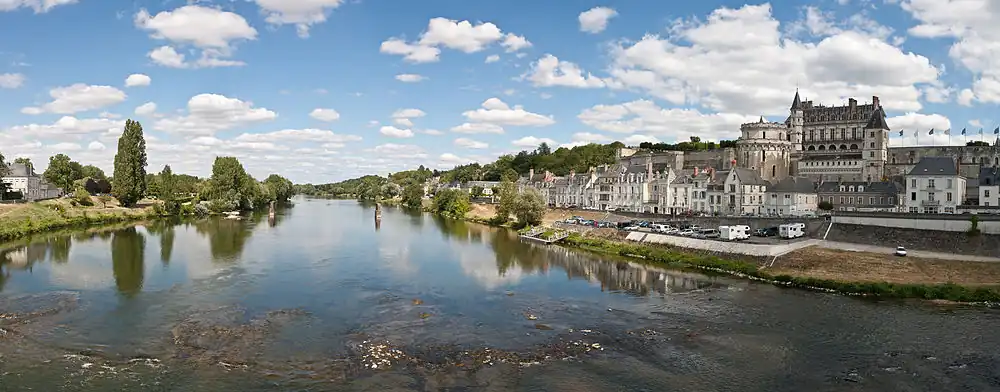Amboise | |
|---|---|
 Amboise, street near the castle | |
.svg.png.webp) Coat of arms | |
Location of Amboise | |
 Amboise 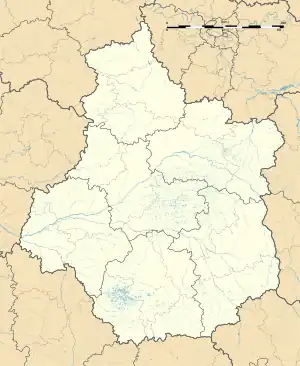 Amboise | |
| Coordinates: 47°24′15″N 0°58′48″E / 47.4042°N 00.98°E | |
| Country | France |
| Region | Centre-Val de Loire |
| Department | Indre-et-Loire |
| Arrondissement | Loches |
| Canton | Amboise |
| Intercommunality | Val d'Amboise |
| Government | |
| • Mayor (2020–2026) | Thierry Boutard[1] |
| Area 1 | 40.65 km2 (15.70 sq mi) |
| Population | 12,938 |
| • Density | 320/km2 (820/sq mi) |
| Time zone | UTC+01:00 (CET) |
| • Summer (DST) | UTC+02:00 (CEST) |
| INSEE/Postal code | 37003 /37400 |
| Elevation | 52–127 m (171–417 ft) (avg. 58 m or 190 ft) |
| 1 French Land Register data, which excludes lakes, ponds, glaciers > 1 km2 (0.386 sq mi or 247 acres) and river estuaries. | |
Amboise (US: /ɒ̃ˈbwɑːz/;[3] French: [ɑ̃bwaz] ⓘ) is a commune in the Indre-et-Loire department in central France. Today a small market town, it was once home of the French royal court.
Geography
Amboise lies on the banks of the river Loire, 27 kilometres (17 mi) east of Tours. It is also about 18 kilometres (11 mi) away from the historic Château de Chenonceau, situated on the river Cher near the small village of Chenonceaux. Amboise station, on the north bank of the Loire, has rail connections to Orléans, Blois and Tours.
History
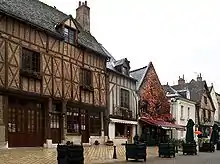
Clovis I (c. 466 – 511) and the Visigoths signed a peace treaty of alliance with the Arvernians in 503, which assisted him in his defeat of the Visigothic kingdom in the Battle of Vouillé in 507.
Joan of Arc passed through in 1429 on her way to Orleans to the Battle of Patay.
Château du Clos Lucé was the residence of Leonardo da Vinci between 1516 and his death in 1519. Da Vinci died in the arms of King Francis I,[4] and he was buried in a crypt near the Château d'Amboise. The house has lost some of its original parts, but it still stands today containing a museum of da Vinci's work and inventions, and overlooks the river Loire.
The Amboise conspiracy was the conspiracy of Condé and the Huguenots in 1560 against Francis II, Catherine de' Medici and the Guises.
The Château at Amboise was home to Mary Stewart, Queen of Scots, for much of her early life, being raised there at the French court of Henry II. She arrived in France from Scotland in 1548, aged six, via the French king's favourite palace at Saint-Germain-en-Laye near Paris, and remained in France until 1561, when she returned to her homeland—sailing up the Firth of Forth to Edinburgh on 15 August that year.
The Edict of Amboise (1563) conceded the free exercise of worship to the Protestants.
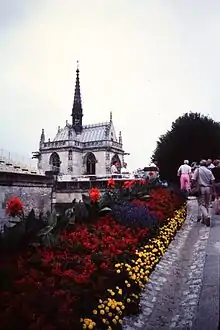
Here was born in 1743 Louis Claude de Saint-Martin, French philosopher, known as Le Philosophe Inconnu (d. 1803).
Abd el Kader Ibn Mouhi Ad-Din (c. 1807 – 1883) was imprisoned at the Château d'Amboise.
In 2019, the 500th anniversary of da Vinci's death, Amboise held many events celebrating the master's life and his work completed in the town.[5] The number of visitors to Château du Clos Lucé, for example, was estimated as 500,000 in 2019, a 30% increase over the typical annual number.[6]
Population
|
| ||||||||||||||||||||||||||||||||||||||||||||||||||||||||||||||||||||||||||||||||||||||||||||||||||||||||||||||||||
| Source: EHESS[7] and INSEE (1968-2017)[8] | |||||||||||||||||||||||||||||||||||||||||||||||||||||||||||||||||||||||||||||||||||||||||||||||||||||||||||||||||||
Sights
The city is known for the Clos Lucé manor house where Leonardo da Vinci lived (and ultimately died) at the invitation of King Francis I of France, whose Château d'Amboise, which dominates the town, is located just 500 m (1,640 feet) away. The narrow streets contain some good examples of timbered housing.
Just outside the city is the Pagode de Chanteloup, a 44-metre-tall (144 ft) Chinese pagoda built in 1775 by the Duke of Choiseul. The pagoda is seven levels high, with each level slightly smaller than the last one. An interior staircase to reach all levels is open to the public.
The Musée de la Poste (in the Hôtel Joyeuse) is a museum tracing the history of the postal delivery service.
A 20th-century fountain by Max Ernst stands in front of the market place.
Economy
Amboise has a thriving tourism-related business community.[9][10][11] Until 2021, it had also the headquarters of Mecachrome, a precision engineering company that operates in the aerospace, motor racing, energy and defence sectors.[12]
International relations
Amboise is twinned with:
Gallery
 Amboise viewed from the Château d'Amboise
Amboise viewed from the Château d'Amboise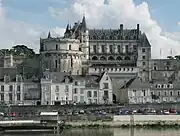 Château d'Amboise
Château d'Amboise Tour de l'Horloge (the Clock Tower)
Tour de l'Horloge (the Clock Tower) Exterior shot of the Clos Lucé Mansion
Exterior shot of the Clos Lucé Mansion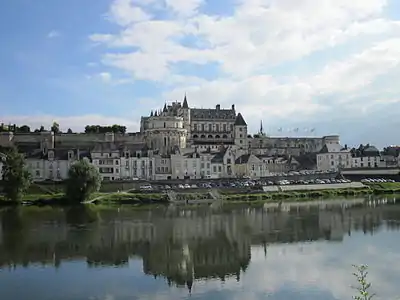 Château d'Amboise over Loire
Château d'Amboise over Loire.JPG.webp) Amboise (cityview from the castle)
Amboise (cityview from the castle).jpg.webp) Pagode de Chanteloup, built in 1775 by the Duke of Choiseul
Pagode de Chanteloup, built in 1775 by the Duke of Choiseul
See also
- Communes of the Indre-et-Loire department
- Colin Biart, 15th/16th-century French architect
- Lestra
References
- ↑ "Répertoire national des élus: les maires". data.gouv.fr, Plateforme ouverte des données publiques françaises (in French). 9 August 2021.
- ↑ "Populations légales 2021". The National Institute of Statistics and Economic Studies. 28 December 2023.
- ↑ "Amboise". The American Heritage Dictionary of the English Language (5th ed.). HarperCollins. Retrieved 29 August 2019.
- ↑ "Leonardo da Vinci | A chinese scholar lost in renaissance Italy". Archived from the original on 26 July 2018. Retrieved 20 October 2015.
- ↑ "Archived copy". Archived from the original on 3 July 2020. Retrieved 2 December 2019.
{{cite web}}: CS1 maint: archived copy as title (link) - ↑ "500 Years After Leonardo Da Vinci's Death, France Celebrates His Life And Work". NPR. 29 November 2019. Retrieved 2 December 2019.
- ↑ Des villages de Cassini aux communes d'aujourd'hui: Commune data sheet Amboise, EHESS (in French).
- ↑ Population en historique depuis 1968, INSEE
- ↑ "Amboise: Charming Visitors Since Leonardo da Vinci". Rick Steves. Retrieved 18 March 2023.
- ↑ "Hôtel Le Clos d'Amboise". The Telegraph. 30 November 2016. ISSN 0307-1235. Retrieved 18 March 2023.
- ↑ Nadeau, Sophie (28 March 2022). "A Guide to the Best Things to do in Amboise, Loire Valley". solosophie. Retrieved 18 March 2023.
- ↑ "Mecachrome France (31700) : siret, siren, TVA, bilan gratuit..." entreprises.lefigaro.fr. Retrieved 18 March 2023.
